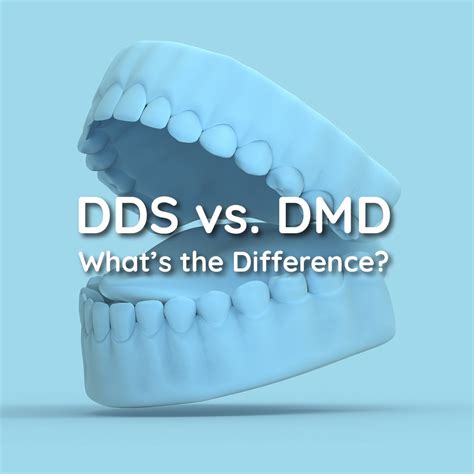What Is Dds And Dmd

Dental education and career paths can be complex, with various degrees and certifications that often confuse not just patients but also aspiring dentists. Two of the most common and esteemed degrees in the field of dentistry are the Doctor of Dental Surgery (DDS) and the Doctor of Dental Medicine (DMD). Despite their similar sounding names, these degrees have distinct histories, implications, and, in some cases, differences in curriculum focus, though both ultimately lead to the same professional outcome: becoming a qualified dentist.
Historical Context of DDS and DMD
The distinction between DDS and DMD originates from historical differences in the philosophical approaches to dental education. The Doctor of Dental Surgery degree (DDS) was first awarded in the United States in 1840 by the Baltimore College of Dental Surgery, reflecting the surgical aspect of dentistry. On the other hand, the Doctor of Dental Medicine degree (DMD) emerged later, with the first DMD degree being awarded by Harvard University in 1867. The DMD degree emphasized the medical aspects of dentistry, recognizing the intricate relationship between oral health and overall bodily health.
Curriculum and Educational Differences
While both degrees signify that the holder has completed the necessary education and clinical training to become a licensed dentist, there are subtle differences in how the curriculum might be structured or emphasized. For instance, schools awarding the DMD might place a slightly greater emphasis on the biomedical sciences and the diagnosis of diseases affecting the teeth, mouth, and surrounding tissues, reflecting the “medicine” in DMD. Conversely, schools awarding the DDS might traditionally focus more on the surgical procedures and the technical skills required in dentistry, aligning with the “surgery” aspect of DDS.
However, it’s crucial to note that these differences are more theoretical than practical and can vary significantly from one institution to another. Both DMD and DDS programs must adhere to the standards set by the Commission on Dental Accreditation (CODA), ensuring that graduates of either program are equally qualified to practice dentistry.
Licensure and Practice
In terms of licensure and the right to practice, there is no difference between a DDS and a DMD. Both degrees qualify individuals to take the National Board Dental Examination (NBDE) and obtain a dental license in the United States. The choice between pursuing a DDS or a DMD often comes down to the specific dental schools an individual is admitted to, as some institutions offer one, the other, or both.
Conclusion
In summary, while the Doctor of Dental Surgery (DDS) and the Doctor of Dental Medicine (DMD) degrees have historical and philosophical underpinnings that differentiate them, they are functionally equivalent in terms of professional outcomes. Both degrees signify expertise in dental care, with graduates being fully qualified to diagnose, treat, and prevent diseases and conditions of the teeth and mouth. As such, patients seeking dental care should focus more on the qualifications, experience, and bedside manner of their dentist rather than the specific degree they hold.
What is the primary difference between a DDS and a DMD degree?
+The primary difference lies in the historical emphasis and philosophical approach, with DDS focusing on the surgical aspect and DMD on the medical aspect of dentistry. However, both degrees lead to the same professional outcome and licensure.
Is one degree considered superior to the other?
+No, both DDS and DMD degrees are considered equivalent in terms of professional qualifications and are recognized by state and national dental boards.
Can I choose which degree I want to pursue?
+The choice often depends on the dental schools you are accepted into, as some schools offer DDS, some offer DMD, and a few offer both.
In the field of dentistry, the pursuit of either a DDS or a DMD degree signifies a commitment to providing high-quality care and continuing the legacy of dental professionals who have tirelessly worked to improve oral health and well-being for generations. As dentistry continues to evolve, understanding the foundations and implications of these degrees can foster a deeper appreciation for the complexity and richness of the profession.
